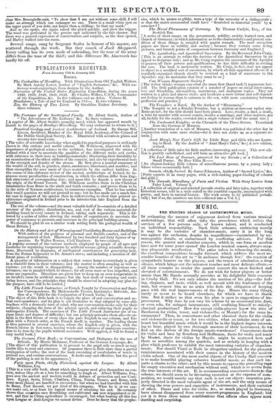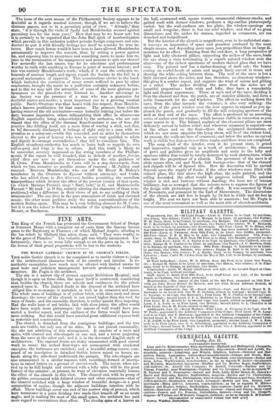MUSIC.
tHE ENSUING SEASON OF INSTRUMENTAL MUSIC.,
Is estimating the amount of enjoyment derived from various musical undertakings, that will often take the precedence which enlists tha services of a few persons only, of known talent, and is conducted on individual responsibility. Such little schemes, embracing merely it may be the varieties of chamber-music, carry it in the long- run against the orchestra, despite its magnificence—encumbered by un- manageable details, or embarrassed by conflicting advisers. For this reason, the quartet and chamber concerts, which in one form or another have now for some years opened the London musical season, always occa- sion pleasurable recollection. The pains taken in rehearsing the music, the excellent compositions brought forward, which address tho most re- condite beauties of the art to " fit audience though few," the reaction of sympathetic hearers on the players, and the truest of admiration a deep silence, which brings out the minutest touches and most delicate effects,— all these conspire to render the quartet concert the most finished and elevated of entertainments. We do not wish for better players or better music than Mr. Dando annually provides at his delightful little concerts in Crosby Hall. We not only admire the unction of his play—the feel- ing, elegance, and taste, which so well accord with the bonhommie of the man, but respect him as an artist who feels the obligation of keeping pace with the real improvements of the day. Hence the many things, rarely or never to be heard elsewhere, for which we have to thank. him. But it strikes us that even his plan is open to suggestions of im- provement. Why does he not vary his scheme by an occasional trio, duet, or even solo, for stringed instruments, still confining himself to strictly- classical productions? How few except violin-players know the trios of Beethoven for violin, tenor, and violoncello; or Mozart's for the same in- struments? Then, in concertant,e and other classical duets for the violin and violoncello or tenor, or for two violins, what an infinite store of un- heard but beautiful music which it would be in the highest degree interest. ing to hear, played by two thorough masters of their instrument, do we find on the shelves of the foreign music-warehouse! Concertante-duets for violin and bass by Romberg and Hoffmann, duets for violin and tenor by Mozart, duets for violins by Haydn, might be scattered here and there as novelties among the quartets, and as strictly in keeping with a plan which professes to exhibit the most interesting varieties of chamber- music. Nor should Viotti or Rode be altogether omitted, for the pleasant reminiscences associated with their names in the history of the modern violin school. One of the most useful objects of the Crosby Hall concerts is to make beautiful playing subserve beautiful music; so that each im- parts a charm to the other; and by this means to oppose the prevailing raga' for empty execution and mechanism without soul, which is so averse from the true interests of the art. If, in recommending concertante-duets to ther scheme, we should seem to be favouring execution at the expense of com- position, we would merely say that such is not our object: execution pro- perly directed is the most valuable agent of the art, and the only means of showing the true powers and capacities of instruments, and their varieties of effect. Duets and trios for violin, &c., so much played in Germany, have almost disappeared from every concert-programme in England; but yet it is from these minor combinations that effects often appear most startling and surprising.. The issue of the next season of the Philharmonic Society appears to be doubtfhl as it regards musical interest; though, if we are to believe the German papers, not so in a pecuniary point of view. " Already," they state, " it is through the visits of Spohr and Mendelssohn secured against pecuniary loss for the next year." How that may be we know not; but it is certainly to be regretted that the John Bull spirit of insubordination which prevails in this orchestra neither permits foreign composers and con- ductors to quit it with friendly feelings nor itself to consider its true in- terest. How much better would it have been to have allowed Mendelssohn permanently to improve the concert, than, by setting a power against his, and exposing him to annoyance and something more, to make him re- joice in the termination of his engagement and anxious to quit our shores! For assuredly the last season was for its selections and performances worthy to rank with anything in Europe in point of musical interest; and this was entirely Mendelssohn's work; which, if it cost the orchestra re- hearsals of unusual length and rigour, repaid the Society to the full in a general acclamation of approval. This conscientious service to the band, which included the correction of many errors suffered to pass by other conductors, brought the music to a perfection certainly unknown before; and to this we may add the attraction of some of the most glorious per- formances on the pianoforte ever listened to. Another advantage to the Society was the presence of a man who was a guarantee for doubtful names and merits; a most important one to a growing musical public. Bach's Overture was thus heard with due respect, from Mendels- sohn's known predilection for that master. The pressure from without having removed the old conductors—some formally retiring just before the duty became imperative, others relinquishing their office in silence—no English superiority being acknowledged by the orchestra, who are con- vinced that the office of the German Kapell-meister is one of bona fide practice like fiddling itself; not a mere form of waving a stick, and that, to be decorously discharged, it belongs of right only to a man with re- putation as a composer,—with this conceded, and an artist by themselves elected to the post of honour who was in every way qualified to adorn and dignify it—strange contradiction ! they fail to conciliate him. The English syniphony-orchestra has much to learn both as regards its own self-respect and what is due to others. And this truth is likely to be somewhat severely impressed on the erring members of the Philhar- monic, if the report be well founded, that in default of another foreign chief they are now to put themselves under the sole guidance of M. Costa. From Mendelssohn to Costa will be a step downwards, from which we ;can conceive no possible means of reascent : M. Jullien must succeed. Between Mendelssohn, who cut off Sir Henry R. Bishop's trombones in the Overture to Egmont without ceremony, and Costa, who has added them to Don Giovanni, besides permitting the merciless transpositions which destroy the effect of the present version of that opera, (in which Madame Persiani sings " Batti, batti," in G, and Mademoiselle Favanti " Mi tracli " in D flat, entirely altering the character of those com- positions,) what a difference in their views of art, to say nothing of their attainments! The one lives in the pure atmosphere of noble and elevated music; the other must perforce study the mean conventionalisms of the modern Italian opera. This may be a very befitting element for M. Costa; but it is not the school to form a conductor of the symphonies of Haydn, Mozart, or Beethoven.



























 Previous page
Previous page